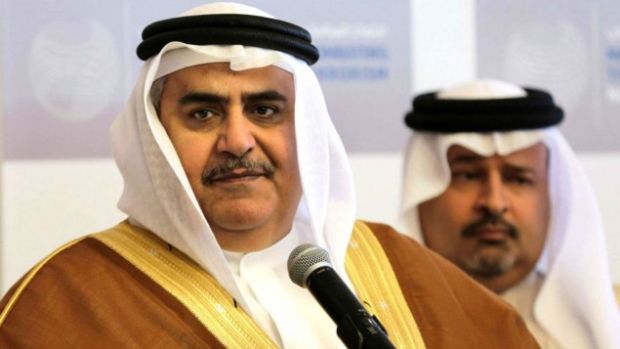
Bahraini Foreign Minister Sheikh Khalid Bin Ahmed Al Khalifa speaking with journalists at a conference focused on combating international terror financing in Manama, Bahrain, on November 9, 2014. (AP/Hasan Jamali)
In an exclusive interview with Asharq Al-Awsat, Bahrain’s Foreign Minister Sheikh Khalid Bin Ahmed Al Khalifa said the P5+1—the United States, the United Kingdom, France, Russia, China and Germany—focused only on the nuclear aspect of the deal while ignoring Tehran’s involvement in terrorism in the region.
“Do you know the amount of explosive material smuggled into Bahrain? It was sufficient to obliterate Manama from existence,” said the FM who on Wednesday accompanied King Hamad Bin Isa Al Khalifa on an official visit to Paris to discuss regional issues, including the Iran nuclear deal.
Bahrain seized explosives and bomb-making materials, including powerful explosive C4, in a village near the capital Manama in June in what it said was an Iranian attempt to subvert the island kingdom and other fellow Gulf states.
The Bahraini FM said the Iran deal “does not address all sources of tension” between Tehran and the Gulf Cooperation Council (GCC) member states. “In fact, the deal will lift sanctions on certain Iranian companies and figures who are linked to terrorism,” he warned.
Iran and six world powers reached a nuclear deal in July that calls for Tehran to reduce its enrichment in exchange for the lifting of economic sanctions. Gulf states fear that lifting the sanctions on Iran would enable it to pursue destabilizing policies in the region.
In order for the deal to reflect positively on the region’s peace and stability, Sheikh Khalid said, “First, Tehran must be fully committed to meeting its requirements. Second, there must be parallel action to repair Iran’s ties with its neighbors.”
Sheikh Khalid said it was premature to assess the deal, but he expressed hope that it would “prompt [Iran] to follow a moderate policy that contributes to finding solutions to the outstanding problems.”
When asked whether his government fears the deal could increase Iran’s presence in the region, Sheikh Khalid said it could help stabilize the region “provided that [Tehran] commits to a policy of good neighborliness and refrains from interfering in the internal affairs of other countries.”
Regarding the crisis in Yemen, where Bahrain is taking part in the Saudi-led coalition against the Houthis, Sheikh Khalid said Gulf states had to choose military action after the Iran-allied rebels took over the capital Sana’a and toppled the internationally recognized government in September of 2014.
“The moment they [Houthis] put down their weapons, we will be ready to return to a clear political process [in Yemen,]” he said.
Saudi Arabia launched a military campaign against the Houthis in Yemen in late March with the aim of restoring exiled President Abd Rabbuh Mansur Hadi to power.
